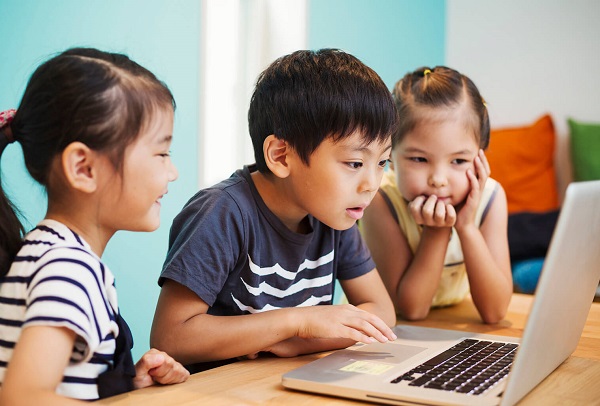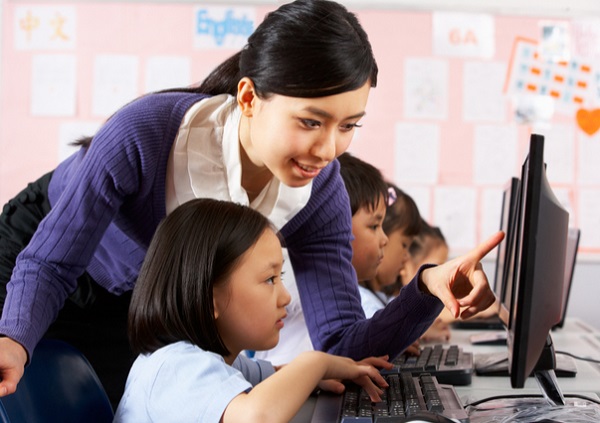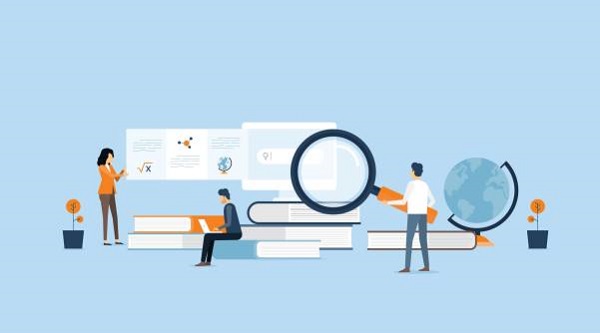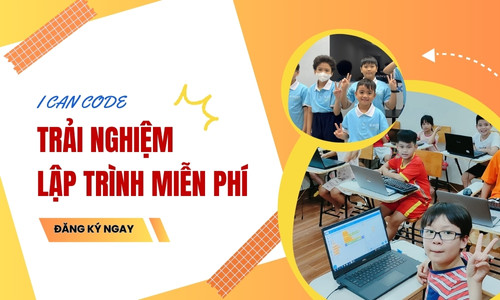When should you introduce your kids to computers? And what are some important basic computer skills for kids? Let’s read on for some important computer basics for kids.

Technology is a huge part of our lives, but it’s changing quickly, so figuring out how to teach kids computer basics can be a challenge. Do phones count as computers? What about voice-activated assistants? When should you sit down and teach a child how to use an actual PC?
Thanks to technology, your child is probably already familiar with computers. The changing nature of computers means that kids’ first introduction to computers isn’t a laptop or desktop anymore. If you’ve ever handed a young child your phone, or if your kid has ever asked Alexa to play a song, they’ve interacted with a computer.
When should you introduce your child to computers?
Every family will have a slightly different answer to this question, based on their lifestyle and relationship with technology.
Some babies will be familiar with computers because they will have seen their parents using them. Others won’t see a computer until they’re older. There are a couple of general guidelines, however. You’ll want to introduce computers to kids when:
- They’re old enough to at least understand what a computer is (children under three will only see light and noise)
- They’re, at most, old enough to start using computers in school
- You’re present, so you can supervise them
Specifically, this means computers can be introduced to your child between the ages of 3 and 6. You might want to start your child on educational programs, or on cooperative family games. Anything you do, however, should be introduced with you present. Young children should not be using a computer or learning online without supervision.
Teaching your child how the computers work
The best way to introduce your child to a computer is to start them on a family laptop or desktop rather than a tablet or phone.
Why? This limits the child’s access and allows you to teach them the basics: such as how to turn the computer on and off, and how to open and close software.
Kids will also need to learn how to use traditional computers with keyboards because they are likely to be using them at school and because learning on an actual computer will help them understand the basics of hardware and software, and boost their typing and mouse skills in a way that touchscreens cannot. You may also consider showing your child a video or website about the history of computers for kids, so they have a better understanding of what computers are and how they developed over the years.
At this point, you should also be teaching kids basic computer hygiene, like washing (and thoroughly drying) their hands before using the computer, using gentle hands and keeping food and drinks away from the keyboard. This will give your child a solid foundation when it comes to learning on computers at school and to complete homework.
What are important computer skills for kids?
No matter their interest level in computers, all kids need some of the same computer skills in order to be successful at school. After all, most of their schoolwork and homework will be completed on a computer, and as they get older, they may be required to have an email address, or specific social media accounts.
Typing
Good keyboard skills are essential when children are learning at school; studies show that touch typing increases accuracy and the speed with which kids can type. It’s also best to teach good typing skills at a young age; children pick up skills more quickly than adults, so the sooner kids learn to type, the better.

You can teach a child how to type by yourself, or they can learn to type using specific programs such as Typing Club, a game like Jungle Junior, or a software program like Typing Instructor for Kids 5.0.
When your child gets older, they may ask for an email address to keep in touch with friends, or they may need one for school.
This could happen as soon as second or third grade, when they’re old enough to be able to read and write well (and before they’re able to join social media networks). They will, however, need adult guidance and you’ll need to keep an eye on their inbox and outbox (as well as their spam).
Consider using a program like Outlook, which downloads messages to your machine, rather than a web-based account. This will keep your child off the open Internet, and — while they’re still young — lets you download messages first, reading through them before your child does.
Online research
As your child gets older, they’ll be using the Internet to search for information for school projects, and here too they will need support from a grown-up. While your child will probably be old enough to use a computer independently by the time they’re assigned reports that require research (probably between the ages of 8 and 12), you should help them with their first research projects and teach them how to use search engines.

Research is more than typing a term into a search bar. As you probably already know, not all websites are trustworthy, but your child is still learning. Make sure they learn basic search skills. Your kids will need to know where to find good information, which sites can’t be trusted and they’ll also have to be monitored, in case they get off track and end up in another corner of the Internet. (It may help to set up parental controls that limit their ability to browse.) Once children understand online research and can work independently, stay close by while they are learning so you can keep an eye on them and answer any questions.
Coding
Coding is an important skill for kids to learn for several reasons. It’s a language, for one thing, and learning new languages help with brain development.Also, gaining proficiency in coding will help kids understand the technology that permeates their worlds and help kids move from being consumers of technology, to creators. Coding also helps teach kids patience and critical thinking as they experiment with programming — such as in a robotics course. When they’re developing apps, being concerned with user experience can teach kids empathy.
(reference source: by A.J. O’CONNELL)
Learn more “8 reasons why every child should learn to code“

